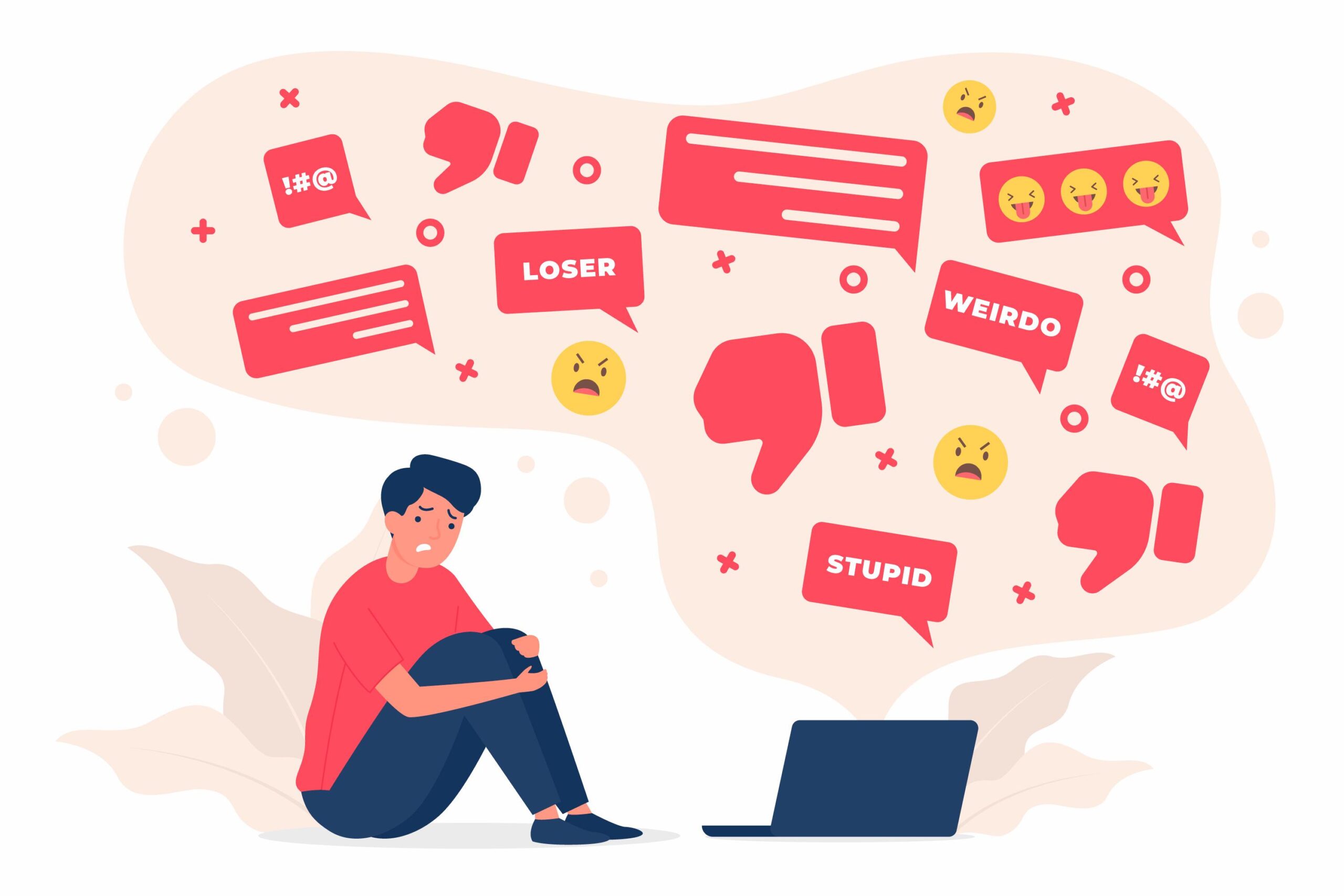Handling negative comments on social media is an essential skill for individuals and businesses alike. In the digital age, social media platforms serve as both a blessing and a curse. They provide a space for engagement, connection, and communication, but they also open the door to criticism and negativity. Navigating these choppy waters can be daunting, but with the right strategies and mindset, it’s possible to turn even the most scathing comments into opportunities for growth and improvement. This article will guide you through understanding, responding to, and ultimately benefiting from negative comments on social media.

Understanding Negative Comments
To effectively handle negative comments, it’s crucial to understand what they are and why they occur. Negative comments come in many forms, ranging from mild criticisms to outright abusive language. They can be triggered by a variety of factors, including dissatisfaction with a product or service, misunderstandings, or simply the commenter having a bad day. Recognising the different types of negative comments and their common triggers can help you approach them with the right strategy.
Types of Negative Comments
Negative comments can be broadly categorised into constructive criticism, complaints, and trolling. Constructive criticism, although negative in tone, often contains valuable feedback that can help you improve your offerings. Complaints usually stem from a specific issue the commenter has experienced, and addressing these can lead to a resolution and improved customer satisfaction. Trolling, on the other hand, is intended to provoke and upset without any real basis. Understanding these distinctions is key to crafting an appropriate response.
Also, Read – How to Use TikTok for Business Marketing
Common Triggers for Negative Comments
Negative comments often arise from unmet expectations, poor customer service experiences, or controversial content. By identifying these triggers, you can proactively address potential issues before they escalate. For instance, setting clear expectations about your products or services and consistently delivering high-quality customer service can reduce the likelihood of receiving negative feedback. Additionally, being mindful of the content you post and considering its potential impact on your audience can help prevent backlash.
The Psychological Impact of Negative Comments
Negative comments can have a profound psychological impact on both individuals and businesses. It’s important to acknowledge these effects and take steps to mitigate them.
Impact on Individuals
For individuals, especially those with a significant online presence, negative comments can lead to stress, anxiety, and a decrease in self-esteem. It’s crucial to develop a thick skin and not let these comments define your self-worth. Practising self-care and seeking support from friends, family, or professionals can help you cope with the emotional toll.
Impact on Businesses
For businesses, negative comments can harm your reputation and deter potential customers. However, they also present an opportunity to demonstrate your commitment to customer satisfaction. By addressing complaints promptly and professionally, you can turn dissatisfied customers into loyal advocates. It’s important to view negative feedback as a chance to improve your offerings and strengthen your brand.
Preparing to Handle Negative Comments
Preparation is key to effectively managing negative comments. Establishing a social media policy and training your team are essential steps in this process.
Establishing a Social Media Policy
A well-defined social media policy provides guidelines for responding to negative comments. It should outline the tone and manner in which responses should be crafted, as well as the escalation process for more serious issues. This ensures consistency and professionalism in your responses, helping to protect your brand’s reputation.
Training Your Team
Your team should be equipped with the skills and knowledge to handle negative comments effectively. Training sessions should cover the types of negative comments they may encounter, appropriate responses, and techniques for de-escalating tense situations. Empowering your team with the right tools and strategies will enable them to manage negative feedback confidently and competently.
Strategies for Responding to Negative Comments
When it comes to responding to negative comments, there are several strategies you can employ to maintain a positive online presence and resolve issues effectively.
Also, Read – How to Drive Traffic to Your Website with LinkedIn
Stay Calm and Professional
It’s essential to remain calm and professional, even when faced with harsh criticism. Responding with anger or defensiveness can escalate the situation and damage your reputation. Take a deep breath, stay composed, and focus on addressing the issue at hand.
Respond Promptly
Timely responses show that you value your customers and take their concerns seriously. Aim to respond within 24 hours, if possible. This demonstrates your commitment to resolving the issue and can help prevent further frustration on the part of the commenter.
Address the Issue Directly
When responding to negative comments, it’s important to address the issue directly. Acknowledge the commenter’s concerns, apologise if necessary, and provide a solution or next steps. This shows that you are taking their feedback seriously and are committed to resolving the issue.
When to Ignore Negative Comments
Not all negative comments warrant a response. In some cases, it’s best to ignore them.
Identifying Trolls and Spammers
Trolls and spammers thrive on attention and engagement. Responding to their comments can encourage further negative behaviour. Instead, it’s best to ignore or block these individuals to prevent them from disrupting your online community.
Recognising Constructive Criticism
Constructive criticism, while negative, can be valuable. Recognising the difference between a troll and someone offering genuine feedback is essential. Constructive criticism should be addressed and used as an opportunity for improvement, whereas trolling should be ignored.

Turning Negative Comments into Opportunities
Negative comments, when handled correctly, can be turned into opportunities for growth and improvement.
Learning from Feedback
Negative comments often contain valuable feedback that can help you improve your products, services, or customer experience. By analysing this feedback and implementing changes, you can enhance your offerings and prevent similar issues in the future.
Building Stronger Relationships
Responding to negative comments in a thoughtful and helpful manner can build stronger relationships with your audience. It shows that you care about their opinions and are willing to go the extra mile to resolve their concerns. This can lead to increased loyalty and positive word-of-mouth.
Tools and Resources for Managing Negative Comments
There are various tools and resources available to help you manage negative comments effectively.
Social Media Monitoring Tools
Social media monitoring tools can help you track and respond to negative comments in real-time. These tools provide alerts and analytics, allowing you to stay on top of your social media presence and address issues promptly.
Professional Support and Consultancy
In some cases, seeking professional support or consultancy can be beneficial. Social media experts can provide guidance on best practices for handling negative comments and help you develop strategies for maintaining a positive online presence.
Also, Read – How to Use Quora for Content Marketing
Real-Life Examples of Handling Negative Comments Effectively
Learning from real-life examples can provide valuable insights into handling negative comments effectively.
Case Studies from Brands
Many brands have successfully navigated negative comments by responding thoughtfully and professionally. Studying these case studies can provide inspiration and practical tips for your own responses.
Lessons Learned from Influencers
Influencers often face a high volume of negative comments and have developed effective strategies for managing them. Learning from their experiences can help you handle negative feedback with grace and confidence.
The Long-Term Approach to Negative Comments
Handling negative comments is an ongoing process that requires continuous effort and improvement.
Continuous Improvement
Regularly reviewing and refining your approach to handling negative comments is essential. Gather feedback from your team and audience, and use it to make adjustments to your social media policy and response strategies.
Maintaining a Positive Online Presence
Consistently maintaining a positive online presence can help mitigate the impact of negative comments. Focus on delivering high-quality content, engaging with your audience, and showcasing your commitment to customer satisfaction.
Conclusion
Negative comments on social media are an inevitable part of having an online presence, but they don’t have to be detrimental. By understanding the types and triggers of negative comments, preparing your team, and employing effective response strategies, you can turn these challenges into opportunities for growth and improvement. Remember, the way you handle negative comments can significantly impact your reputation and relationship with your audience. Stay calm, be professional, and always look for ways to learn and improve from the feedback you receive.
FAQs
How should I handle a negative comment from a high-profile user?
Address it professionally and promptly, acknowledging their concerns and providing a solution. High-profile users have significant influence, so handling their comments well is crucial.
Should I delete negative comments on my social media pages?
Generally, it’s better to respond than delete. Deleting comments can escalate the situation and lead to further backlash. However, comments that are abusive, spam, or violate community guidelines can be removed.
How can I prevent negative comments?
While you can’t prevent all negative comments, you can reduce their frequency by setting clear expectations, delivering quality products and services, and providing excellent customer service.
What if I receive a negative comment that I can’t resolve immediately?
Acknowledge the comment and let the user know you are looking into the issue. Provide a timeline for when they can expect a resolution and follow up accordingly.
Is it okay to take negative comments personally?
It’s natural to feel affected by negative comments, but it’s important to remain professional and not take them personally. Focus on addressing the issue and learning from the feedback.
Can responding to negative comments improve my brand’s reputation?
Yes, responding thoughtfully and professionally can demonstrate your commitment to customer satisfaction and improve your brand’s reputation.
How do I handle negative comments on multiple social media platforms?
Use social media monitoring tools to track comments across platforms and ensure consistent, timely responses. Establish a unified approach and train your team to handle comments on all platforms effectively.

